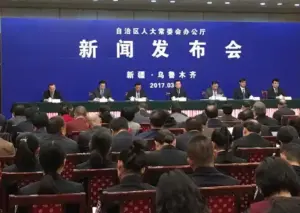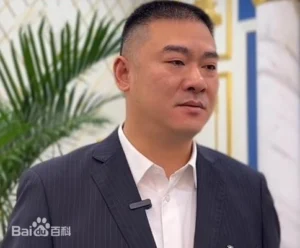
2015 was a year in which the national cybersecurity and informatization system implemented the central government’s decision-making and deployment, promoted the rule of law in the Internet, and centralized the governance of the Internet space. The local cybersecurity and informatization offices actively studied the characteristics of the local cybersecurity and informatization work, adopted a series of effective measures according to local conditions, and achieved phased results, and the cyberspace gradually became clear. China Cyberspace Affairs Network has successively launched a series of interviews with the directors of local cybersecurity and informatization offices, mainly introducing the situation of the local areas in the fields of Internet development, informatization construction, media integration, etc. in 2015. This issue introduces an exclusive interview with Luo Fuyong, director of the Xinjiang Uygur Autonomous Region Cybersecurity and Informatization Office.
China Internet Information Network: How is the development of the Xinjiang Uygur Autonomous Region in terms of Internet and informatization?
Luo Fuyong: Today, the Internet is profoundly affecting the development of the world’s politics, economy, culture and society at a rapid speed. It has also provided a strong impetus for the economic development of our region, injected great vitality into social progress, and brought great convenience to people’s lives.
Since Xinjiang was connected to the international Internet in August 1997, the Internet and informatization have achieved sustained and rapid development. At present, Xinjiang has formed a modern communication system that complements wired and wireless, combines broadband and narrowband, develops cities and villages in a balanced manner, and is oriented towards intelligence and integration.
At the end of 2014, there were more than 15,000 registered websites in the region, 3.057 million fixed broadband access users, and the Internet two-way bandwidth out of Xinjiang reached 1490G. At the same time, the electronic information manufacturing industry has also achieved a breakthrough. In 2014, there were 105 software companies; the multilingual software industry began to take shape, and the Uyghur-Kazakh computer operating system was developed, opening up a new field of computer and ethnic information processing in my country; the “Tianshan Cloud” plan was launched, industries mainly based on cloud computing data centers were developed, and three cloud computing industrial parks (bases) were built. Xinjiang’s Internet industry has achieved sustained and rapid development, the number of netizens has grown steadily, and the number of mobile netizens has continued to increase. According to statistics, there are more than 11.39 million netizens in our region, more than 13 million mobile Internet users (including about 5 million netizens in ethnic minority languages), the growth rate of netizens is 13.7%, and the penetration rate is 49%, ranking 9th among all provinces and regions in the country.
China Internet Information Network: What do you think is the particularity of the autonomous region’s Internet work? In view of these particularities, how is Xinjiang’s Internet information work carried out?
Luo Fuyong: Xinjiang is a frontier position in the fight against separatism, terrorism, and infiltration, and the Internet is the main battlefield for the struggle of public opinion in the field of ideology. Therefore, doing a good job in Xinjiang-related Internet work is very important in maintaining social stability, and the task is arduous.
In Xinjiang, the primary and core task of network security and informatization is to do a good job in network security related to Xinjiang, and the main task of doing a good job in network security in Xinjiang is to win the war of online anti-terrorism and stability maintenance. In response to the current situation, the Party Committee of the Autonomous Region has put forward the working idea of ”strengthening the crackdown and educating and guiding”. On the one hand, special operations are deployed to carry out severe crackdowns, and on the other hand, “de-extremism” is used to guide.
Online violent terrorist audio and video is an important inducement for violent terrorist activities. In order to maintain social stability in Xinjiang and build a strong network defense line for long-term peace and stability, since June 2014, the central government has launched multiple rounds of special operations to eradicate online violent terrorist audio and video, and concentrated on cleaning up online violent terrorist audio and video across the entire network nationwide, severely cracking down on illegal acts of publishing, disseminating, and storing violent terrorist audio and video, and curbing the momentum of the rampant and wanton spread of online violent terrorist audio and video.
Propagating religious extremism is the basis of violent terrorist activities. The Xinjiang Cyberspace Administration has actively explored in the work of “de-extremism” and used modern culture to hedge against religious extremism. In 2014, we planned and held a large-scale online cultural event “Wedding in Taklimakan”, and held a modern collective wedding for more than 300 couples. Under the demonstration and guidance of these activities, all parts of the region spontaneously held more than 6,000 online cultural activities of various types, shot more than 20,000 micro-videos, and excavated more than 40,000 typical character stories.
China Internet Information Network: Compared with previous years, what is the biggest highlight of Xinjiang’s Internet information work in 2015?
Luo Fuyong: 2015 is the 60th anniversary of the founding of the Xinjiang Uygur Autonomous Region. Focusing on the theme of “unity, struggle, patriotism, and gratitude”, our office actively organized and planned online theme propaganda and online cultural activities with the praise of the 60th anniversary of the founding of the autonomous region as the center, giving full play to the communication and influence of new media, and actively creating a grand, warm, festive and harmonious online public opinion atmosphere.
Online theme propaganda: First, the work system operates efficiently and builds a three-dimensional online propaganda model. The Cyberspace Administration of the Party Committee of the Autonomous Region has played the role of Xinjiang’s online publicity system, established a green channel with the Central Cyberspace Administration, mobilized all online publicity resources, and formed a three-dimensional online publicity model of “two microblogs, one terminal, one website, and one newspaper” (microblog, WeChat, mobile client, website, mobile newspaper), integrating national and Xinjiang news websites, government websites, major commercial websites, folk language websites and other website resources.
Second, the scale of publicity is huge, and the number of views far exceeds that of previous years. Daqing’s online publicity has achieved “three coverages”, namely, covering news websites, commercial websites, and new media platforms, covering Chinese, foreign languages and minority languages, and covering official websites and folk platforms. More than 4,300 online media and new media platforms at home and abroad participated in the coverage of the 60th anniversary of the establishment of the autonomous region. The number of online publications and forwardings is the highest value of large-scale activities in Xinjiang over the years, and the cumulative number of clicks has reached 600 million. Only Xinjiang’s online media have published 108,000 texts related to “Celebrating the 60th Anniversary of the Founding of the Autonomous Region”.
Third, four “firsts” have achieved new breakthroughs in online publicity. For the first time, we coordinated the foreign language channels and folk language channels of key central news websites such as Xinhuanet and International Online to push multilingual reports. For the first time, all the homepages of 1,100 websites in Xinjiang were red, achieving a “bright red background”. For the first time, we mobilized folk language forces to join the online propaganda lineup. The new mobile propaganda position participated in the 60th anniversary celebration for the first time. On the National Day, Shache Town, Shache County, Ying’erike Township, Awati County and other places held flag-raising ceremonies, people’s big stage and other activities.
In terms of online cultural activities: Since the beginning of the year, our office has successively launched 8 large-scale online cultural activities such as “Ten Thousand Stories for the Motherland”, “Yarkand River Tells You”, “A Day in Xinjiang”, “Adiles Shows Kunlun”, and “Mobile Network Bazaar”, which played a demonstration and leading role in modern culture, promoted the image of Xinjiang, gathered the hearts of the people, and achieved a win-win situation of social and economic benefits.
These online cultural activities were reprinted and broadcasted by traditional media, television media, online media, and new media nationwide, causing a huge response in Xinjiang, the country, and the entire network, forming a bright, unprecedented, and powerful Daqing propaganda “potential field”. According to incomplete statistics, the publicity of various online cultural activities to celebrate the 60th anniversary has accumulated and reached 2 billion people so far.
China Internet Information Network: What attempts has the Autonomous Region’s Internet Information Office made in promoting the development of new media and government new media?
Luo Fuyong: Since 2014, Xinjiang has mobilized 200,000 cadres to go to the grassroots to carry out a three-year “visiting the people, benefiting the people’s livelihood, and gathering the people’s hearts” activity. In order to fully cooperate with this activity, the Xinjiang Internet Information Office has created the “Last Mile” WeChat public account and mobile client, which has become a communication and demonstration platform for the “visiting the people, benefiting the people’s livelihood, and gathering the people’s hearts” activity by reporting the real stories of grassroots cadres. At present, the “Last Mile” has more than 1 million followers, covering all provinces, cities, and districts in the country and dozens of countries, becoming a classic case of national government new media. Creatively build a “zero distance” Xinjiang (region, prefecture, county) three-level network linkage propaganda platform, with 117 accounts in the region joining and more than 5 million users following it.
China Internet Information Network: This year, the Central Cyberspace Affairs Office proposed the strategic concept of “One Belt, One Road” network first. How does the Cyberspace Affairs Office of the Autonomous Region Party Committee lead local websites to play the role of network media in promoting the construction of the “One Belt, One Road”?
Luo Fuyong: The integration and development of traditional media and emerging media is the general trend, and the connection of emerging media with traditional media is also the only way for Xinjiang to spread the “One Belt, One Road” through all media. In recent years, the Xinjiang Cyberspace Affairs Office has made active explorations in using emerging media to amplify the external propaganda effects of traditional media.
First, support traditional media to develop new media communication platforms. Xinjiang Daily launched the Xinjiang Daily website, reporting on Xinjiang in five languages, including Chinese, Uyghur, Kazakh, Mongolian, and Kyrgyz. Xinjiang People’s Broadcasting Station launched the Xinjiang News Online website, using three languages, including Uyghur, Kazakh, and Kyrgyz, to spread Xinjiang to the world around the clock. Xinjiang People’s Radio Station also cooperated with China Radio International’s “Panorama China” column to produce a 10-minute feature film every two weeks, which is available for foreign netizens to listen to through China Radio International’s official website. Xinjiang TV broadcasts programs in two languages, Kazakh and Kyrgyz, through its official website, and publishes documentaries, feature films, and cultural evenings reflecting Xinjiang on the Internet for free viewing by foreign netizens.
Second, use new media to expand the influence of foreign propaganda journals. Xinjiang’s foreign propaganda journals “Friends” in Kazakh and English, and “Land Bridge” in Russian and Tajik, respectively, cooperate with Tianshan.com and Yaxin.com to publish electronic journals online. In 2012, the English version of “Friends” landed in Pakistan, and an English website was opened at the same time, mainly focusing on “Chinese Dream”, “Belt and Road”, “Xinjiang Intangible Cultural Heritage” and other topics to introduce Chinese civilization, Xinjiang culture and economic and social development.
Third, produce foreign propaganda products suitable for new media dissemination. Xinjiang’s Cyberspace Administration fully utilizes new media platforms to promote foreign propaganda products related to Xinjiang, and has made new attempts in content expression, external form, and dissemination channels. The content is more story-telling, from a comprehensive introduction to ordinary people’s stories. Books such as “We Xinjiang People” and “Why Xinjiang is Good” have been published, and promotional films such as “Ethnic Groups Living in Xinjiang, China” and “Trilogy of Xinjiang Folk Customs” have been filmed. The external form is gradually “fragmented”, from “heavy and long” picture albums, books, and TV feature films to short and exquisite brochures and short videos. The “Knowing Xinjiang” and “Xinjiang Customs” series of brochures have been published, and short videos such as “The Most Beautiful is Our Xinjiang” and “Xinjiang is a Good Place” have been filmed.
China Internet Information Network: Xinjiang Internet Illegal and Bad Information Reporting Platform is officially launched. Please introduce the details.
Luo Fuyong: On August 6, 2015, Xinjiang Internet Illegal and Bad Information Reporting Platform was officially launched, marking the official launch of our region’s network reporting work, and also marking that our region’s cyberspace rule of law has taken another step forward. The reporting center has invested energy, formed a team, and established a mechanism to continuously extend its tentacles downward and earnestly grasp the construction of the city and county-level network civilization supervisor team. At present, a team of more than 1,800 network civilization supervisors has been established in 14 prefectures, states and cities, including Urumqi, Kashgar and Shihezi. Since the reporting center went online, as of the end of 2015, a total of more than 500,000 reports of harmful information have been received.
China Internet Information Network: What measures has the autonomous region’s Internet Information Office taken to manage online rumors?
Luo Fuyong: Internet rumors are extremely harmful to society. Not only does it seriously interfere with people’s production and life, it also constantly destroys the social trust system, damages the image of the party and the government, and even triggers mass incidents that endanger social stability. Therefore, we also have a deep understanding and high vigilance against online rumors. Our attitude is also the most severe, which is “zero tolerance”.
At present, our Xinjiang Internet Information Office has explored some relatively effective methods in the practice of managing online rumors. It is a comprehensive governance model that combines work discovery with mass reporting, online governance with offline crackdowns, and official rumor refutation with folk rumor refutation. In addition to regular patrols, monitoring and clean-up and rectification, the Xinjiang Internet Information Office has also set up a special online rumor-refuting reporting platform on more than 1,500 websites across Xinjiang, unblocked the reporting channels for online rumors, introduced reward measures, and encouraged and mobilized people of all ethnic groups to participate in reporting. At the same time, a large number of clues of crimes of fabricating and spreading malicious rumors that caused social panic on the Internet were handed over to the Xinjiang Public Security Bureau, and nearly a thousand people were investigated and punished.
China Internet Information Network: Please introduce the construction of the Internet information system in the region. How do you think we can do a good job in network security and informatization? What are the difficulties facing the current Internet management work? What are your expectations for the Internet information work in the region?
Luo Fuyong: Xinjiang, like other provinces (autonomous regions and municipalities), has successively established the Xinjiang Internet Information Office and the Office of the Leading Group for Network Security and Informatization of the Autonomous Region Party Committee since the end of 2013. One organization, two signs, further clarified the work responsibilities. At present, various prefectures and cities in Xinjiang have also learned from the institutional model of the autonomous region and successively established Internet information offices, and some prefectures and cities have also increased their staffing.
At present, Xinjiang’s counter-terrorism and stability maintenance tasks are very heavy. We have a sense of mission and a sense of urgency in our work. To do a good job in Xinjiang’s network security and informatization is to carry forward the “Xinjiang Network and Information Spirit” of being loyal, tough, strong, aggressive, and calm, and serve the overall goal of Xinjiang’s social stability and long-term peace and stability.

